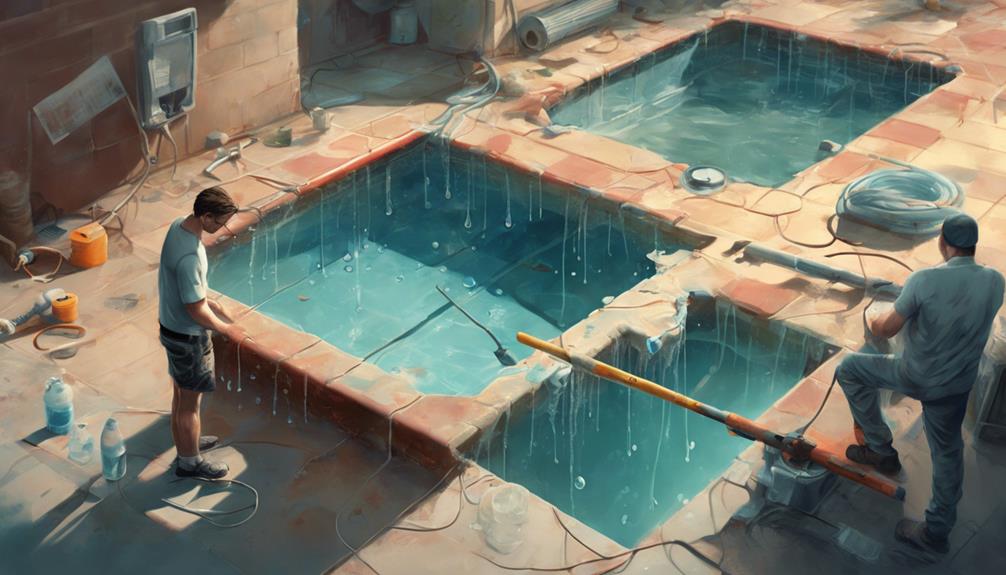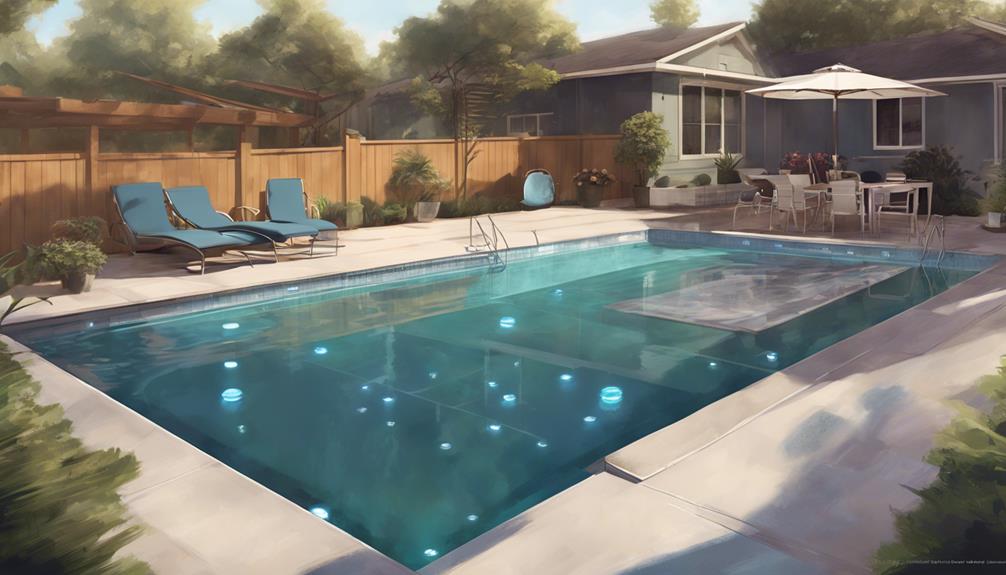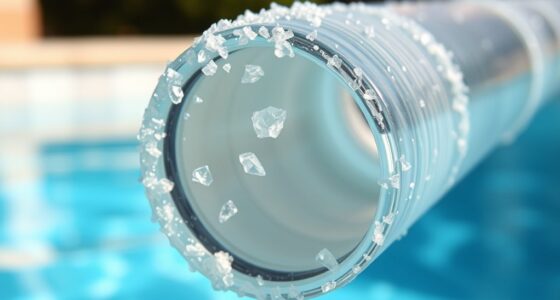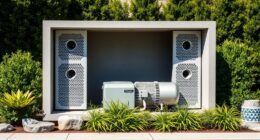Master the art of detecting pool leaks by monitoring water levels, checking for wet spots, and inspecting the pool structure for signs of damage. It is important to promptly address any cracks in the pool liner with a suitable patch kit or seek professional help for more severe damage. Be on the lookout for unexplained increases in water usage, as this could indicate underground pipe issues, and maintain a proactive cleaning schedule to prevent gunite pool leaks. Owners should regularly clean the pool, test water chemistry, and inspect equipment for efficient maintenance. By following these key steps, you will be able to troubleshoot and repair pool leaks like a pro.
Key Takeaways
- Conduct regular inspections for leaks and water loss.
- Utilize dye tests and listening devices for detection.
- Address minor leaks promptly with patch kits.
- Seek professional help for major or underground leaks.
- Maintain proper pool care to prevent future leaks.
Identifying Pool Leak Signs
To effectively troubleshoot and repair pool leaks, the initial step involves identifying common signs indicating the presence of a leak in the pool. Monitor the water levels regularly to detect any unexplained drops. Pay attention to excessive water usage, wet spots around the pool, or equipment, and air bubbles in the pump basket.
Inspect the pool structure for any cracks, tears, or separations in the pool liner, tiles, or decking. Additionally, observe if the pool requires more frequent chemical balancing or if there is algae growth despite regular maintenance. These signs can help pinpoint the location of the leak and guide the repair process efficiently, ensuring the pool remains in top-notch condition.
Handling Pool Liner Cracks
Upon identifying cracks in the pool liner, it is imperative to address these issues promptly to prevent further damage and maintain the structural integrity of the pool.
Small cracks can lead to significant leaks if left unattended, causing water loss and potential damage to the pool structure. For minor cracks, consider using a patch kit specifically designed for pool liners as a temporary fix.
However, it is essential to consult professionals for larger or more severe cracks to determine the best course of action, which may involve replacing the entire pool liner.
Detecting Underground Pipe Issues
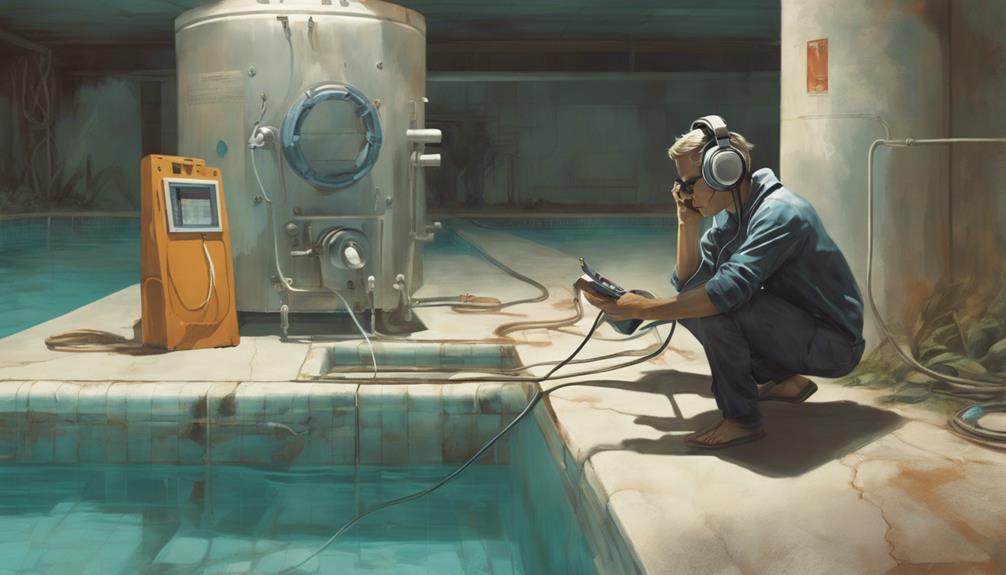
How can pool owners effectively detect underground pipe issues that may lead to leaks and other complications? Here are some key steps to identify potential problems with underground pipes:
- Monitor Water Usage: Keep track of any unexplained increases in water bills, which could indicate a leak in the underground pipes.
- Perform Dye Tests: Conduct dye tests in the pool to check for any significant color changes in the soil around the pool area, indicating a possible leak.
- Use Listening Devices: Utilize specialized listening equipment to detect sounds of running water underground, pointing towards a leak in the pipes.
- Consult Professionals: Seek assistance from experienced pool technicians who can perform pressure tests and thorough inspections to pinpoint underground pipe issues accurately.
Preventing Gunite Pool Leaks
In addressing the maintenance of gunite pools, ensuring a proactive cleaning schedule is paramount to preventing potential leaks and preserving the pool's structural integrity. Regular cleaning not only maintains the pool's aesthetic appeal but also helps in early leak detection. Seeking professional assistance for intricate pool issues and adhering to fundamental pool care routines are essential practices to avoid leaks. Contacting pool service professionals for efficient maintenance is advised to ensure the longevity of the pool.
| Gunite Pool Leak Prevention | Importance | Tips |
|---|---|---|
| Regular Cleaning Schedule | Prevents leaks and maintains integrity | Clean pool walls and floors regularly |
| Professional Help | Detects leaks early and provides solutions | Consult experts for complex issues |
| Basic Pool Care Routines | Avoids leaks by following simple maintenance | Monitor water chemistry consistently |
| Efficient Maintenance | Ensures pool longevity | Regularly inspect pool equipment |
Essential Maintenance Tips for Owners
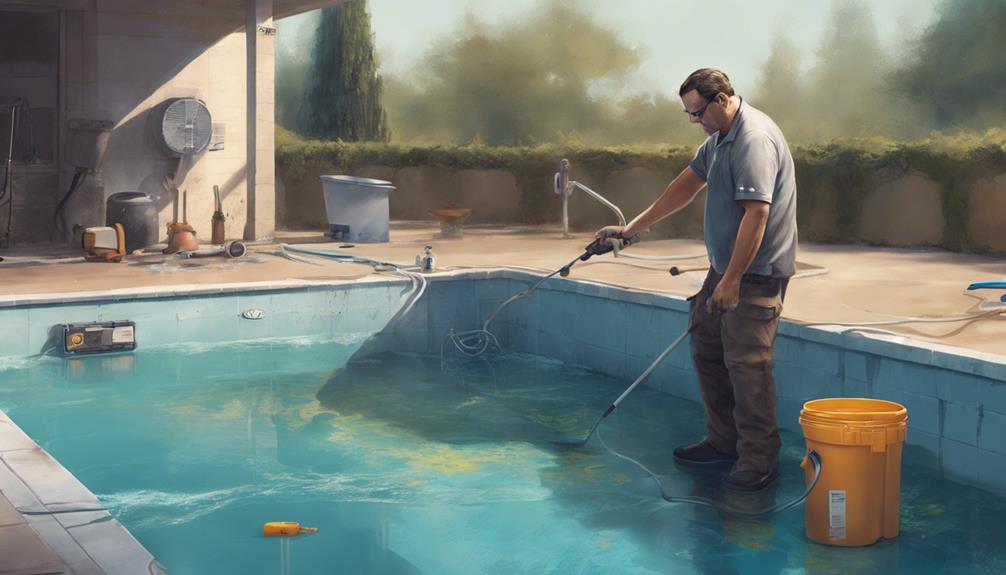
To guarantee the longevity and proper functioning of your pool, implementing a consistent cleaning and maintenance routine is essential. Pool owners can follow these maintenance tips to maintain their pool remains in peak condition:
- Regular Cleaning:
- Clean debris,
- Vacuum the pool, and
- Scrub the walls to prevent blockages and algae buildup.
- Water Chemistry:
- Test and balance the water chemistry weekly to sustain proper pH levels and prevent corrosion or scale formation.
- Equipment Check:
- Inspect and maintain pool pumps,
- Filters, and heaters regularly to ensure peak performance.
- Professional Inspections:
- Schedule annual inspections by pool professionals to detect any potential issues early on and prevent costly repairs.
Frequently Asked Questions
How Can I Prevent Leaks While the Pool Is Not in Use?
To prevent leaks while the pool is not in use, maintain proper water levels, conduct routine inspections, and address any noticeable drops promptly. Implement a stringent maintenance schedule, monitor equipment regularly, and seek professional assistance for thorough leak prevention measures.
What Are the Signs of a Leak in an Above-Ground Pool?
Signs of a leak in an above-ground pool may include a sudden drop in water level, wet spots around the pool, or unexplained algae growth. Regularly check for these signs to detect leaks early for prompt repairs.
Is There a DIY Solution for Repairing Small Leaks in Pool Liners?
Repairing small leaks in pool liners can be likened to a delicate dance; DIY solutions like patch kits offer temporary relief. For a lasting fix, consult experts to address underlying issues and guarantee the pool's integrity.
How Can I Maintain Proper Water Chemistry to Prevent Leaks?
Maintaining proper water chemistry is essential to prevent leaks. Regularly test water pH, alkalinity, and sanitizer levels. Balance chemicals as per manufacturer guidelines. Clean filters, skimmers, and pump baskets regularly. Seek professional advice for precise chemical adjustments.
What Are the Common Causes of Sudden Pool Leaks?
Sudden pool leaks can stem from various sources like deteriorating pool liners, underground pipe corrosion, or structural issues. Timely detection through regular maintenance and professional inspections can prevent costly damages and guarantee pool longevity.
How Can Pool Revamping Help in Detecting and Repairing Leaks?
Revamping your pool can help in detecting and repairing leaks, ultimately leading to pool energy savings. By identifying and fixing any leaks, you can prevent unnecessary water and energy waste. A pool energy savings revamp can ensure that your pool is operating at its most efficient level and can save you money in the long run.
Can Pool Cracks Cause Pool Leaks and How Can They be Repaired Like a Pro?
Yes, pool cracks can indeed cause pool leaks, leading to water loss and potential structural damage. To repair them like a pro, explore different pool crack repair options such as epoxy injections, crack stitching, or using flexible sealants to ensure a lasting and effective solution.
Conclusion
To sum up, maintaining your pool like a pro is akin to tending to a delicate garden; vigilance and care are crucial to preserving its beauty and functionality.
By staying attuned to signs of leaks, addressing issues promptly, and implementing preventive measures, you can guarantee your pool remains a pristine oasis for years to come.
Just as a skilled gardener tends to their plants with precision, so too must pool owners nurture their aquatic haven with diligence and expertise.

